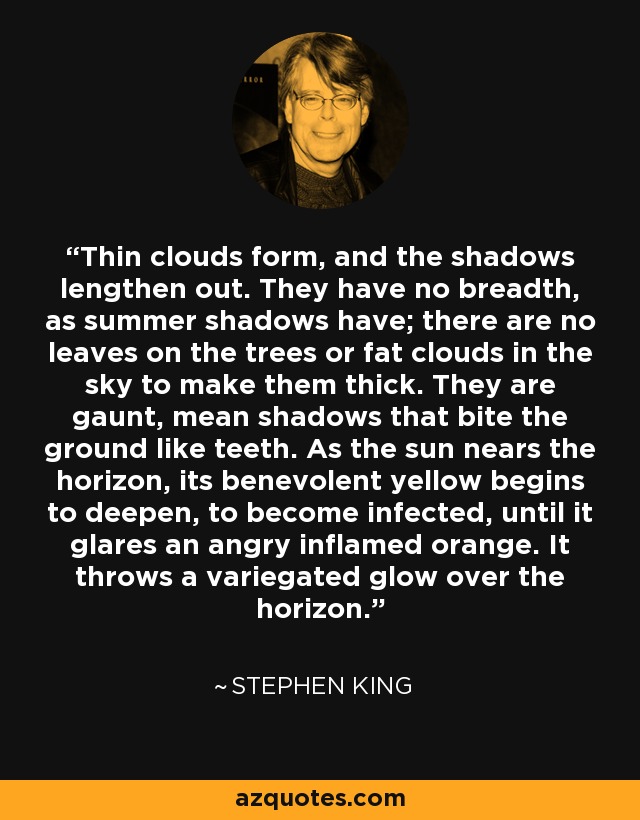Stephen King Quotes: The Power Of Descriptive Writing
If you’re a fan of literature and the power of words, then you’re in for a treat. Today, we’re diving into the captivating world of Stephen King and exploring the profound impact of descriptive writing. Known for his mastery of storytelling, Stephen King has mesmerized readers for decades with his ability to bring characters and settings to life through vivid descriptions. In this article, we’ll delve into some of his most powerful quotes that highlight the importance of descriptive writing and its ability to transport readers to new worlds.
When it comes to descriptive writing, Stephen King is a true maestro. His words have a way of painting pictures in our minds, allowing us to see, hear, and feel the story he’s telling. As we unravel the magic behind his craft, we’ll uncover the secrets to his success and discover how descriptive writing can elevate any piece of literature. So, grab your favorite cup of coffee, settle into a cozy spot, and prepare to be inspired by the genius of Stephen King’s descriptive prowess. Get ready to embark on a journey where words come alive and imagination knows no bounds. Let’s dive in!

Stephen King Quotes: The Power of Descriptive Writing
Descriptive writing is a powerful tool that can transport readers to different worlds, evoke emotions, and create vivid images in their minds. One author who has mastered the art of descriptive writing is Stephen King. Known for his gripping storytelling and vivid imagery, King’s quotes on descriptive writing offer valuable insights into the craft. In this article, we will explore some of Stephen King’s most powerful quotes on the power of descriptive writing and how they can inspire and guide aspiring writers.
The Importance of Creating Detailed Imagery
Stephen King once said, “Description begins in the writer’s imagination, but should finish in the reader’s.” This quote highlights the importance of creating detailed imagery that allows readers to fully immerse themselves in the story. When writers paint a vivid picture with their words, readers can visualize the setting, characters, and events, making the reading experience more engaging and memorable.
Descriptive writing not only enhances the reader’s experience but also helps in establishing the atmosphere and tone of the story. Through well-crafted descriptions, writers can evoke specific emotions and create a sense of urgency, fear, or excitement. Stephen King’s novels are known for their immersive descriptions, which play a crucial role in building suspense and tension.
Creating Memorable Characters through Description
One of the hallmarks of Stephen King’s writing is his ability to create memorable characters. Descriptive writing plays a significant role in bringing these characters to life. King once said, “Good description is a learned skill, one of the prime reasons why you cannot succeed unless you read a lot and write a lot.”
By providing vivid physical descriptions, exploring characters’ thoughts and emotions, and delving into their unique quirks and mannerisms, writers can make their characters feel real and relatable. Descriptive writing allows readers to form a connection with the characters, making them care about their journey and invest emotionally in the story.
When it comes to writing memorable characters, King emphasizes the importance of avoiding stereotypes. He encourages writers to dig deeper and uncover the complexities and contradictions that make characters truly interesting. By incorporating detailed descriptions, writers can create characters that feel authentic and multi-dimensional.
The Impact of Sensory Details in Descriptive Writing
In his book “On Writing: A Memoir of the Craft,” Stephen King emphasizes the importance of sensory details in descriptive writing. He writes, “Description begins in the writer’s imagination, but should finish in the reader’s senses.” This quote highlights the role of sensory details in immersing readers in the story and making it come alive.
By appealing to the senses of sight, sound, smell, taste, and touch, writers can create a more immersive reading experience. Sensory descriptions allow readers to feel like they are part of the story, experiencing the sights, sounds, and sensations alongside the characters. This level of immersion makes the story more engaging and helps readers connect with the narrative on a deeper level.
King’s use of sensory details is evident in his horror novels, where he masterfully creates an atmosphere of fear and suspense. By describing the eerie sounds, the smell of decay, and the chilling touch of a ghostly presence, he taps into readers’ deepest fears and keeps them on the edge of their seats.
The Power of Simplicity in Descriptive Writing
While descriptive writing often involves intricate details and rich imagery, Stephen King reminds writers of the power of simplicity. He once said, “The road to hell is paved with adverbs.” This quote emphasizes the importance of using strong, precise language and avoiding excessive adjectives and adverbs.
By focusing on precise and evocative words, writers can create descriptions that are impactful and memorable. Instead of relying on adverbs to convey emotions or actions, King encourages writers to choose strong verbs and use concise language to create a more vivid and powerful narrative.
In his own writing, King demonstrates the effectiveness of simplicity. His straightforward prose and concise descriptions allow readers to fully immerse themselves in the story without getting bogged down by unnecessary details. This approach makes his writing accessible and engaging to a wide range of readers.
In conclusion, Stephen King’s quotes on descriptive writing offer valuable insights into the craft. From the importance of creating detailed imagery to the impact of sensory details and the power of simplicity, King’s wisdom can inspire and guide writers in their own pursuit of mastering descriptive writing. By incorporating these principles into their writing, aspiring authors can create engaging, immersive stories that leave a lasting impression on their readers. So, let Stephen King’s words be a reminder of the power of descriptive writing and a guide for aspiring writers on their creative journey.
Key Takeaways: Stephen King Quotes – The Power of Descriptive Writing
- Descriptive writing brings stories to life, making them more vivid and engaging.
- Stephen King’s quotes emphasize the importance of using descriptive language to create powerful imagery.
- Descriptive writing helps readers form a clear mental picture of the story’s setting, characters, and events.
- Through descriptive writing, emotions and sensations can be effectively conveyed to the readers.
- Stephen King’s quotes remind us that descriptive writing enhances the overall reading experience by immersing readers in the story.
Frequently Asked Questions
What are some famous quotes by Stephen King about the power of descriptive writing?
Stephen King is known for his mastery of descriptive writing. Here are a few of his famous quotes that highlight the power of descriptive writing:
“Description begins in the writer’s imagination, but should finish in the reader’s.”
With this quote, Stephen King emphasizes the importance of vivid descriptions that allow readers to fully immerse themselves in the story. He believes that descriptive writing should create a clear mental image for the reader, engaging their imagination and making the story come alive.
“Good description is a learned skill, one of the prime reasons why you cannot succeed unless you read a lot and write a lot.”
According to Stephen King, descriptive writing is not something that comes naturally to every writer. It is a skill that needs to be honed through extensive reading and writing. By immersing oneself in literature and practicing the craft, writers can improve their ability to create compelling and evocative descriptions.
How does descriptive writing enhance the reader’s experience?
Descriptive writing plays a crucial role in enhancing the reader’s experience. By painting a vivid picture through words, it allows readers to fully immerse themselves in the story. It creates a sensory experience, engaging the reader’s imagination and making the narrative more compelling.
Through descriptive writing, readers can visualize the characters, settings, and events in the story. This visual imagery helps them form a deeper connection with the narrative and the emotions it evokes. Descriptive writing also adds depth and richness to the storytelling, making it more engaging and memorable.
What techniques does Stephen King use to create powerful descriptions?
Stephen King employs various techniques to create powerful descriptions in his writing. One common technique he uses is the use of sensory details. By appealing to the reader’s senses of sight, sound, smell, taste, and touch, he brings the story to life and makes it more immersive.
Another technique Stephen King employs is the use of specific and concrete language. Instead of relying on generic or vague descriptions, he chooses words that are precise and evocative. This helps readers form a clear mental image of the scene or character, making the writing more impactful.
Additionally, Stephen King often incorporates metaphor and simile in his descriptions. By comparing one thing to another, he adds depth and layers of meaning to his writing, making it more memorable and thought-provoking.
How can writers improve their descriptive writing skills?
To improve their descriptive writing skills, writers can follow a few key steps. First and foremost, reading extensively is essential. By exposing themselves to a wide range of literature, writers can study how different authors approach descriptive writing and learn from their techniques.
Practicing writing is equally important. Writers should make a habit of regularly writing descriptive passages, experimenting with different styles and techniques. By actively engaging in the craft, they can refine their skills and discover their unique voice.
Seeking feedback from others is also valuable. Joining writing groups or sharing work with trusted peers allows writers to receive constructive criticism and gain insights on areas for improvement. Taking the time to revise and edit their descriptive writing is crucial for honing their skills and creating impactful prose.
Why is descriptive writing important in storytelling?
Descriptive writing is important in storytelling as it helps to create a vivid and immersive experience for the reader. It allows readers to connect with the characters, settings, and events on a deeper level, bringing the story to life in their minds.
Through descriptive writing, writers can evoke emotions, set the tone, and establish the atmosphere of a scene. It helps to engage the reader’s senses and imagination, making the story more memorable and impactful. Descriptive writing adds depth and richness to the narrative, enhancing the overall storytelling experience.
Stephen King on writing; why he never uses a notebook and other tips from the top!
Final Thoughts: Stephen King Quotes and the Power of Descriptive Writing
As we wrap up our exploration of Stephen King quotes and the power of descriptive writing, it’s clear that King’s mastery of language and imagery is unparalleled. Through his vivid descriptions, he transports readers into his imaginative worlds, evoking emotions and painting pictures in our minds. Whether it’s the eerie setting of the Overlook Hotel in “The Shining” or the haunting presence of Pennywise the Clown in “It,” King’s ability to create a sensory experience through words is truly remarkable.
One of the key takeaways from King’s quotes is the importance of engaging the reader’s senses. By appealing to sight, sound, smell, taste, and touch, descriptive writing allows us to fully immerse ourselves in the story. It’s through these sensory details that we can feel the chill in the air, hear the creaking floorboards, and taste the fear in the characters’ hearts. This level of immersion not only captivates readers but also leaves a lasting impact, making the stories more memorable and resonant.
In addition to the sensory experience, King’s quotes also emphasize the significance of strong and precise language. His meticulous attention to detail and his ability to choose the perfect words create a vivid and engaging narrative. Whether it’s a simple simile or a complex metaphor, King’s use of figurative language adds depth and richness to his stories. It allows readers to see familiar things in a new light and to connect with the characters and their experiences on a deeper level.
In conclusion, Stephen King’s quotes on the power of descriptive writing remind us of the incredible impact that words can have. Through his mastery of language, he takes us on thrilling and unforgettable journeys. So, as aspiring writers, let’s harness the power of descriptive writing to transport our readers, captivate their senses, and create stories that will linger in their minds long after they turn the final page.






